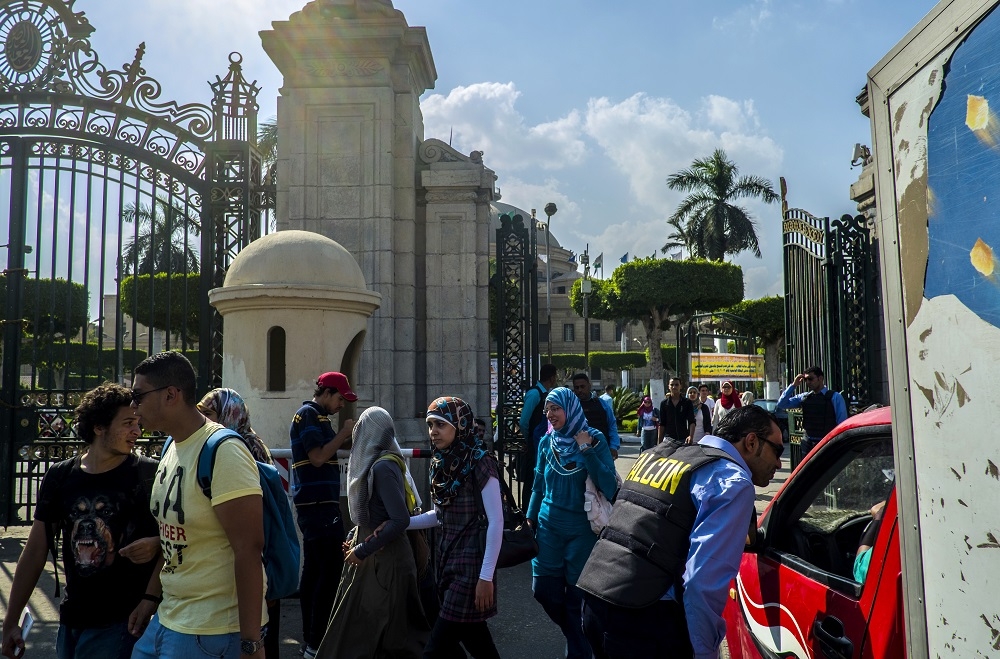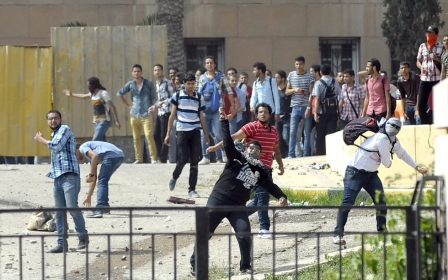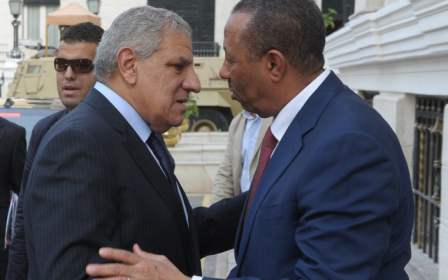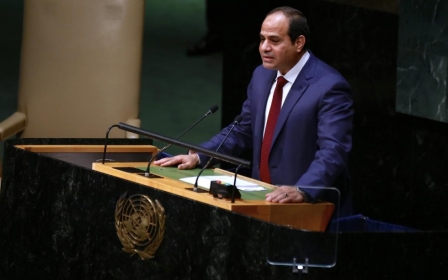New academic years gets off to a tense start in Egypt

The new academic year in Egypt kicked off to a turbulent start on Saturday with at least 41 students reportedly detained and long queues forming outside universities as security checks made entry more difficult.
Protests failed to materialise, but sources from Students Against the Coup, told Middle East Eye that some small demonstrations were expected to take place tomorrow across several campuses.
The semester, which was originally set to start on 27 September, had been postponed until 11 October, with the new term about to usher in an array of changes.
New amendment approved by the Egyptian cabinet at the end of September will now allow university heads to fire professors if they are deemed to be inciting violence, or are accused of organising protest or undermining the integrity of other faculty members.
A new legal police force will also be set up and deployed within universities to patrol the campus, overturning a previous ruling - enacted in 2010 under former strongman Hosni Mubarak - that forbade police presence on campuses.
The moves have sparked criticism from many students and professors who claim that the state is moving in to curtail the rights and freedoms of Egypt’s universities.
“State authorities are giving too much power to universities presidents who, according to a decree issued last June, are now appointed by the Egyptian president,” said Hany el-Hosseiny, a Cairo University professor and a founding member of 9 March Movement for the Independence of Universities.
“This is worrying because it undermines the autonomy of our university heads.”
Since Mohamed Morsi was forced from office in 2013, universities have steadily become centres for anti-government protests where students first began demonstrating against the interim government.
Of Cairo’s roughly one dozen universities, Al-Azhar University - one of the world’s oldest educational institutions and preeminent centre from Islamic studies – has proved to be a particular epicentre for the tensions and its campus has seen weekly, and sometimes daily, confrontation between students and Central Security Forces.
“At least 100 students belonging to al-Azhar have died during clashes within the campus or beside it, most of them in Cairo, while around 1,000 have been detained,” said Yasser Taha, an al-Azhar student who preferred not to use his real name fearing the prospect of reprisal.
“We have been depicted as a bunch of Muslim Brotherhood supporters but there are also people who simply don’t want a repressive regime whose security forces carry on torture and illegal detention without showing any proofs. We don’t want them in our campus”.
Government officials told AP that 16,000 people have been arrested since Morsi’s ouster, although this may just be the tip of the iceberg. An independent report published last May claimed that this figure was much higher and that more than 41,000 people – including 4,768 students - had been arrested and prosecuted since July 2013. Repressive police methods, arbitrary arrests and forced disappearance of citizens have been starkly criticized either by local or international organisations while dozens of activists and journalists continue to lavish in the country’s jails.
Prime Minister Ibrahim Mehleb has hit back at the criticism pointing out that only independent, university-run security will be deployed within university campuses, but this does not necessarily solve the problem.
A private security company called the Falcon Group provides universities with security guards who are deployed on campus to guarantee protection and security. “The head of this company is a retired mukhabarat – Egyptian secret services – officer and it often hires former police officers to head up the internal security within universities,” said Hosseiny. “I do not object to the principle of employing experts in security in our campus, as long as they take orders from university authorities, not the ministry of interior”.
Nor is the campus totally secure from normal police incursions.
“We expect police will enter inside the campus, as it happened several times during the last academic year,” al-Azhar professor Sabry al-Tohamy told Middle East Eye. “If it happens, no matter if it happens during the first day of the new semester or later, this will have negative consequences on our activities and restrain our freedom.”
The risks have left many crying out for more protections.
“Last year, a lot of students died so we need another strategy to face the brutality of security forces,” said Mahmoud, an Al-Azhar student and member of the banned Muslim Brotherhood Freedom and Justice Party.
In recent months, hunger strikes protests have been used to foster awareness about the state’s repressive methods that are practiced both inside jails and on the streets.
“Too many times, big protests led to several killings because it was almost impossible to get out from police fire. I believe we should organise small protest groups in different places that may tire out the police and push the authorities to hear our voice,” Mahmoud said.
The current Egyptian political conditions, dominated by security concerns and by the fight against terrorism, have reduced space for freedom of expression and pose a real threat to the future of Egyptian universities and, generally speaking, to the national educational system. “We will do our best … to postpone the kick-off of the new academic year if police will be deployed in the campus because we want to be considered students, not criminals” said Taha.
According to Mahmoud, the majority of students who protest against the Egyptian authorities are pursuing non-violent methods, however, the repression of students could lead small groups to pursue a more radicalised strategy. Tohamy also explained that the lack of space to debate openly has provoked a backlash amongst Egyptian society.
“Allah created free men and men react if they lack freedom,” Tohamy said.
Hosseiny also shares the idea that troubles within the universities depend much more on the harsh repression of students. He is convinced that security is not the real problem and it has been probably caused by the police reaction to student demonstrations. However, he says, the focus on security issues risks to miss one of the main problem of our Egyptian society: the educational system. “Limits on freedom of expression and tighten up security measures without a clear state commitment on improving the educational system will only reproduce an un-educated society without any space for debating their own issues. In this way, radicalization within our society should be considered a consequence, not a cause, of the current situation”.
New MEE newsletter: Jerusalem Dispatch
Sign up to get the latest insights and analysis on Israel-Palestine, alongside Turkey Unpacked and other MEE newsletters
Middle East Eye delivers independent and unrivalled coverage and analysis of the Middle East, North Africa and beyond. To learn more about republishing this content and the associated fees, please fill out this form. More about MEE can be found here.




